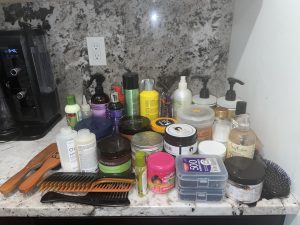The Shackles of Black Hair
October 12, 2021
As a Black woman, having your hair done is just as much of a necessity as wearing clothes when you exit your home.
Looking back, I wonder how many times I’ve sat poolside refusing to enter the water, fearful of messing up my hair? How many times have I missed out on family gym trips, not wanting to sweat my hair out? How many times have I skipped parties or hang-outs because my hair wouldn’t come out the way I wanted it to so I sat in the house instead?
I’ve always loved wearing my hair out and natural, but now it feels more like a chore than a creative form of self-expression. If I am going to wash my hair, I have to set aside an entire day and plan not to see anyone because washing, detangling, deep conditioning and styling takes a whole day’s worth of work. I’ve prioritized finishing my twist-out over doing my homework, forcing me to stay up until unreasonable hours cramming to finish, because the embarrassment of going to school with my hair messed up was worse than the idea of going to class without my work done.
Getting braids, a protective style that will allow me to cut my get-ready time in half, can take up to 12 hours to get done, costing anywhere from $50-$350. I’ve never spent over $180 and I’ve been blessed to have a mother who can braid who also taught me. However, for those who can’t do their own hair and have no friends or family to do it for a discounted price can end up spending a fortune. But as soon as the braids look messy, there’s pressure to take them out, or else someone will call you out saying you don’t take care of yourself.

Hair is a form of expression, but is becoming a means to be judged by. Whenever I leave my house without my hair done–which is quite controversial because a lot of people (especially older Black people) don’t even see an afro as done–I get comments like, “Erin you need to do something with that head,” as if my hair in its natural state is not good enough or acceptable. After hearing phrases like that so many times, it’s been imprinted in me not to respect someone who’s hair isn’t done, and as a result, I’ve said the same thing to other Black girls whose hair I don’t deem to be done. It’s a vicious cycle.
It’s truly sad how much we as Black women have embodied the self-hate that’s been projected onto us for centuries. Slaves were forced to cover their hair, relaxed hair was the standard for my grandma and mother’s generations, now it’s long wigs and weaves, and when it is natural, it’s only deemed as beautiful if there are defined curls on hair that is at least touching the collar bones when straight. I should be comfortable and confident enough to be able to present myself to the public without my hair always being gelled, slicked and defined, but I don’t.
I’ve had this conversation about the amount of work it takes to always keep our hair done and almost every single other Black girl has had similar experiences.
We joke about how much we’d love to just cut it all off one day and dream about the load off it would be to not have to exert so much energy and thought into it every day. However, for a lot of us, we wouldn’t dare. I know I wouldn’t because, whether we know this consciously or subconsciously, we know how much of our self-worth, beauty and femininity comes from having our hair presented in the way we want.
For all women, hair is something that can make or break how we feel about the way we look. However for Black women it’s an even deeper issue. Our femininity is already stripped as people often see our Blackness before our femininity, thus we are already more associated with masculinity. Then, when a shaved head is added on to that, it would be so much harder to be seen as womanly.
It’s also hard to envision myself without a head full of hair when so many of my compliments come from my hair. Walking around at school with my hair out and curly, in a big puff, or with fresh braids, I generally hear at least a few positive comments about my hair daily. Less frequently I get comments of being pretty in general. Am I not pretty without my hair? From these experiences, what else are we, as Black girls, supposed to believe?
As a collective, we need to reflect on our acceptance, or lack thereof, of ourselves when our hair isn’t slicked into a painful ponytail, our edges laid and our hair isn’t in braids so tight they’re causing premature balding. Not only reflecting on our own self-hate but how we project it onto other Black women who go about their day with their hair in a way that we don’t perceive to be done.
Beauty is completely subjective and it is no one’s place to judge what is acceptable or not.
